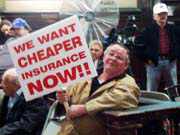The Jersey City Council was unable to adopt the city’s $324 million 2003 budget at their Wednesday night meeting. Three factors stand to delay action on the spending plan.
Council President L. Harvey Smith noted the first factor: “We have not finished all the budget hearings with the heads of the different city departments.” The second roadblock was a $1.9 million premium that the city just realized has been owed by the city for the State Health Benefits plan for nearly 10 years. The outstanding payment was only very recently discovered, officials said.
A third problem for the city is the state’s downgrading of Distressed Cities aid it had promised Jersey City. The state announced last week that it will give the city $2 million rather than $9 million. Both Mayor Glenn Cunningham and members of the Hudson County Freeholders have vowed to get the total amount of money from the state.
Each year, the city has included a certain amount of state aid in its budget, only to find out later that they would get less.
Regarding the health premium, City Business Administrator Carlton McGee said that Jersey City had elected in January of 1993 and June of 1994 to delay monthly payments to the State Health Benefits plan. These payments now add up to $1.9 million.
In a special council meeting held in December, the council already had learned that if it elected to withdraw from the State Health Benefits Program, it would still have to pay a balance of $8.9 million dollars that it owed the state. With the addition of the previously unrecorded debt, which McGee said his office had only discovered Wednesday, the total amount Jersey City would owe if it pulled out of the State Health Benefits Program would increase to $10.8 million dollars.
When asked by Smith about possible solutions to this problem, McGee said he would come back to the council with a solution to the rediscovered debt.
“It’s probably best that we give the money to the state and be done with it,” said McGee. He said that the money to pay the $1.9 million debt would probably have to be financed by a loan.
Memo demands
Meanwhile, another controversy came out of the meeting, which saw the attendance of many city employees. Councilman Junior Maldonado announced Thursday that an ad hoc committee will meet to investigate a memo issued by the mayor’s office calling on city department heads and autonomous agency officials to send employees to the meeting.
The Dec. 30, 2002 memo from Cunningham states: “I would like to have a list of people who work in your department by Jan. 3, a list of all people whom you have invited or confirmed their attendance for Wednesday’s [Jan. 8] meeting. I would also like you to appoint a person to register your department’s attendees on the night of the meeting. That person will sit outside the chambers and check off all who attend the meeting.”
The mayor’s office did respond to phone calls as of press time Friday.
The ad hoc committee is composed of Maldonado and council members Steve Lipski, Peter Brennan and Mary Donnelly. It actually was formed in early 2002 to look into municipal issues, but has not been active until now.
“We might not find anything wrong here,” said Maldonado. “But we are going to look into the memo.”
Budget worries
At Wednesday’s meeting, Councilmember Mariano Vega asked McGee how auditors could have missed the health care premium debt for so many years. McGee, who has only been the city’s business administrator since 2001, could not find a reason and said the matter was being looked into. Maldonado suggested that the auditors be looked into for possible criminal action.
McGee noted the language of the resolutions states: “…should the City of Jersey City elect to terminate participation in the State Health Benefits Program or the program ceases to exist, this premium will become due and payable immediately.”
The Wednesday night meeting was crowded with a large number of city employees who protested any possible switch from the state health plan. Others residents again called for the council to operate free of outside influences and with Mayor Glenn Cunningham.
Firefighter union representative Joe Krajinik protested removing city workers from State Health Benefits plan and then denounced the state for downgrading the Distressed City funding it had promised.
Urging the council to act in concert with Cunningham, Joe Gallo compared Jersey City to Italy in the 1860s before it became a unified nation. Gallo decried the council’s alleged allegiance to Congressman Bob Menendez. In 2001, the council backed the Menendez candidate for county executive, Tom DeGise, and went against Cunningham’s candidate, Bernard Hartnett. This has caused a rift that has not yet healed.
